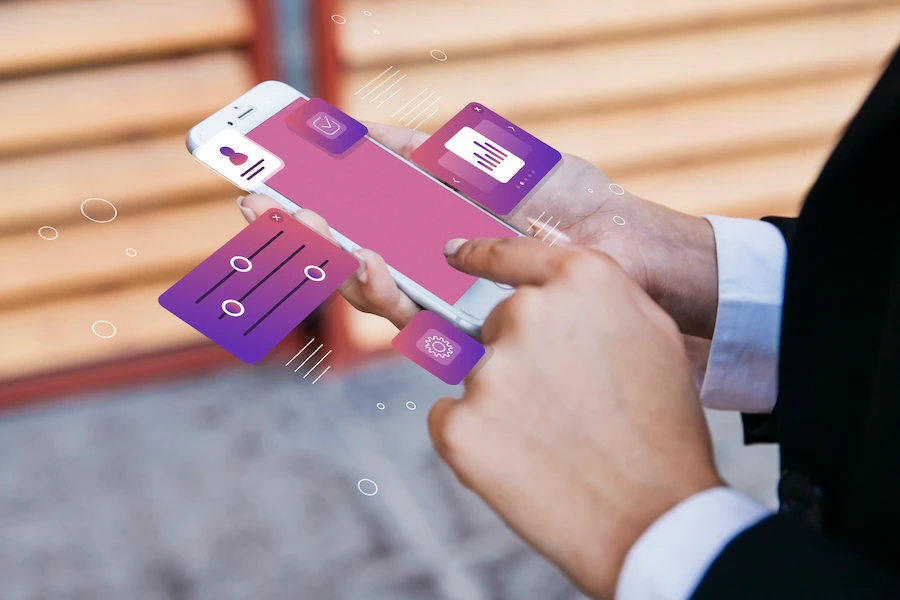The Future Of Business Cards: Are Digital Business Cards The Way Of The Future?
6 Mins Read
Published on: 23 June 2023
Last Updated on: 09 November 2024

toc impalement
Traditional business cards, a steadfast symbol of professionalism and networking, found it hard to maintain a position in front of digital business cards. All credit goes to the technology that is evolving at a breakneck speed.
As smartphones and virtual connections guide our daily lives, we are standing at the crossroads of a major shift in how we exchange contacts and make a lasting impression.
There was a time when a sleeky-designed piece of cardstock was all it took to leave a strong impact on a potential client; that time is gone now. Today, the relentless march of innovation offers us an array of digital alternatives that promise to transform the methods we present ourselves and build professional relationships.
Some common questions every marketer asks are: Will digital business card will completely replace their tangible counterparts? What advantages do they bring to the table? Are they truly the way to the future, or just another fleeting trend in the digital transformation that will fade with time?
In this thought-provoking article, we tried to answer some of those questions while exploring the exciting world of digital business cards. Read on to learn the benefits, drawbacks, and upcoming trends that will open the new way we interact with our network.
The Evolution Of Business Cards
Business cards have a rich history, dating back to the 17th century when they were used as calling cards among the European aristocracy. Over time, they became essential for professionals to exchange contact information and establish connections. Traditional business cards served their purpose well, offering a tangible and convenient way to exchange details during networking events and meetings.
However, as the technology progressed, the limitations of traditional business cards started becoming evident. Handing out physical cards became cumbersome, and the risk of losing or misplacing them was a constant concern. This led to the emergence of digital business cards as a modern solution for networking professionals.
Features And Functionality Of Digital Business Cards
Digital business cards (e-business or virtual cards) are digital representations of traditional business cards. They leverage various interactive elements and multimedia integration, providing a wonderful networking experience.
These cards can be easily shared through email, messaging apps, or QR codes, offering advantages beyond what traditional cards provide.
Customization and personalization are the top features of digital cards that enable individuals to effectively showcase their personal brands and unique selling points. They offer seamless integration with digital platforms and contact management systems, making storing and managing contact information effortlessly easier.
The Advantages Of Digital Business Cards
Digital business cards hold a promising alternative to traditional cards because of the benefits offered.
- They provide improved accessibility and convenience. Instead of carrying a stack of physical cards, professionals can simply share their digital cards with a simple tap or click. This saves time and effort for both parties.
- Digital business cards are eco-friendly and sustainable. The move towards digital solutions aligns with the global push to reduce paper waste and minimize carbon footprint. By adopting digital business cards, you contribute to a greener future while maintaining networking efficiency.
- Digital business cards offer enhanced networking opportunities. With features like clickable links, social media integration, and embedded portfolios, you can showcase your work, achievements, and expertise dynamically and engagingly. This digital medium enables recipients to explore and connect with the individual beyond the initial contact.
- Data collection and analytics are not possible with traditional paper cards, but with digital cards, it’s possible. You can track how many times your card has been viewed or shared. With these insights, you can optimize the card and know the effectiveness of your networking efforts. These analytics provide valuable information for refining networking strategies and measuring the impact of connections made through digital cards.
Challenges And Concerns Of Digital Business Cards
While digital business cards have many advantages, we can’t overlook some challenges and concerns.
- Technological barriers and compatibility issues may arise, as different devices and platforms may not always support the same digital business card format. This could lead to compatibility issues and hinder the seamless exchange of information.
- Privacy and data security concerns are also important factors to consider. With digital business cards, individuals share their contact details and other personal information electronically. Ensuring the security and privacy of this information is crucial to maintaining trust in the digital networking space.
- Some may argue that digital business cards lack the personal touch and human interaction traditional cards provide. The physical exchange of cards often involves a brief conversation or a handshake, which can establish a more memorable and meaningful connection. Digital cards must find ways to replicate or enhance these personal aspects to overcome this challenge.
- There may be resistance to change and adoption challenges among professionals accustomed to the traditional card format. Convincing individuals to transition to digital cards requires education, awareness, and showcasing their tangible benefits.
Future Predictions And Trends Of Digital Business Cards
Looking ahead, the future of business cards appears to be increasingly digital, and they are not untouched by augmented reality (AR) and virtual reality (VR) either.
Imagine a scenario where professionals can hand out AR-enabled cards that trigger interactive experiences or provide virtual tours of their products or services.
Besides that, blockchain technology also promises to enhance the security and authenticity of digital business cards. By leveraging blockchain’s decentralized nature and immutability, professionals can ensure their digital cards cannot be tampered with or falsified. This further establishes trust in the digital networking space.
Artificial intelligence (AI) and chatbot integration are also anticipated to shape the future of digital business cards. We can imagine a digital card with an AI-powered chatbot that can answer basic questions or schedule meetings on behalf of the professional. This level of automation and interactivity would further streamline the networking process.
The market for digital business cards is predicted to grow significantly in the coming years. As more professionals recognize their benefits, adoption rates are expected to rise, leading to an increasingly interconnected digital networking ecosystem.
Strategies For Transitioning To Digital Business Cards
Professionals can follow a few key steps to transition to digital business cards effectively.
- Choose a reliable digital card platform or app that suits your needs and preferences. You should research different options and read reviews to make an informed decision.
- Professionals should design and create impactful digital business cards. They should focus on simplicity, clarity, and visual appeal. Including relevant information, such as a professional headshot, contact details, and links to online portfolios or social media profiles, can make the digital card more engaging and informative.
- Integrating digital cards with traditional networking practices can help balance the two formats. Professionals can still carry a few traditional cards for specific situations that may be more appropriate, such as formal meetings or conferences where physical exchanges are customary.
The Coexistence Of Traditional And Digital Business Cards
Acknowledging that traditional business cards still hold value in certain situations is essential. For example, in cultures where the exchange of physical cards is deeply ingrained in networking etiquette, it is crucial to respect and adhere to these customs.
Managing both traditional and digital cards effectively involves being mindful of the context and preferences of the people one is networking with. Professionals can adapt their approach based on the specific situation, offering a traditional or digital card accordingly.
By balancing the two formats, professionals can leverage the benefits of digital business cards while respecting cultural norms and preferences. This coexistence allows individuals to be versatile in their networking approach, maximizing opportunities for meaningful connections.
Conclusion
With the continuation of technology, the future of business cards is undoubtedly digital. Digital business cards offer various features and benefits that surpass the limitations of traditional cards. They provide improved accessibility, sustainability, networking opportunities, and data collection capabilities.
Looking forward, the future of business cards will likely involve augmented reality, blockchain technology, and AI integration. The market for digital business cards is poised for substantial growth as more professionals recognize the value they bring to networking and communication.
Read Also:


















Comments Are Closed For This Article